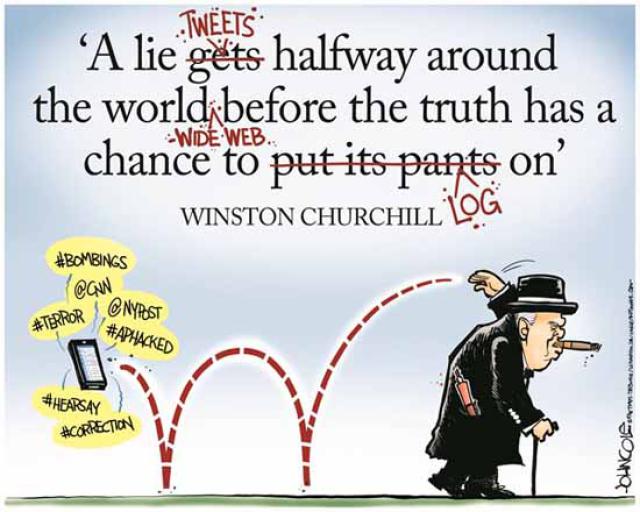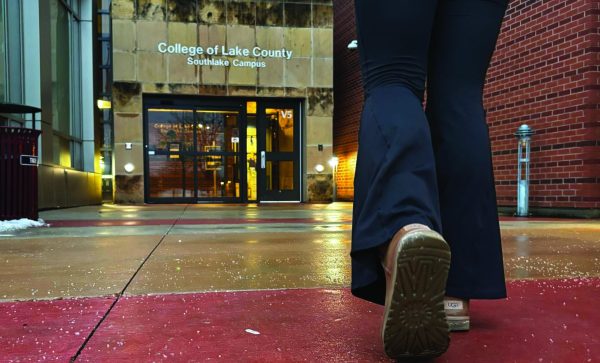The media and the election: causation and consequences
Though results of the election can be blamed on a multitude of phenomena– the DNC, antiquated voting systems, income inequality, foreign intervention– the media’s impact cannot be denied. Whether it be biased news media, invalid clickbait, or social media in and of itself, these various mediums had an unprecedented impact on the election, which will surely be studied for decades to come.
Out of 45 of the highest-circulation newspapers in the country, only one (Las Vegas Review Journal) endorsed Donald Trump, according to Mother Jones. As the electoral votes came in, anchors called states for Trump in shock. Nearly everyone thought that Hillary Clinton would win–even some Trump supporters. The day of the election, FiveThirtyEight made it seem as if she had it “in the bag,” so to speak:
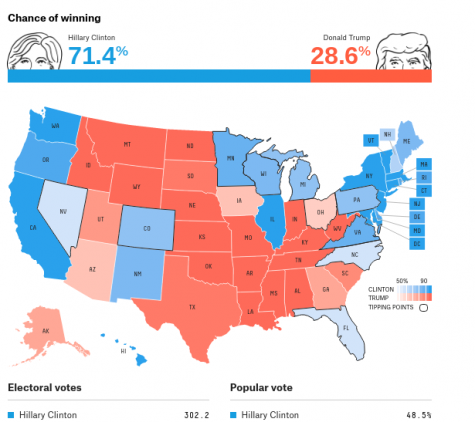 .
.
Going onward, the news media must reflect and make a change in order to maintain trust. Trump, in his ongoing battle with The New York Times, is attempting to belittle the news media.
“Wow, the @nytimes is losing thousands of subscribers because of their very poor and highly inaccurate coverage of the ‘Trump phenomena,’” said Trump in a tweet.
On the contrary, The New York Times has actually seen a surge in subscribers since the election: 41,000, actually, according to CNNMoney. So why is Trump attempting to belittle the company, even if he has to lie to do it?
Well, Trump doesn’t like criticism. The day after he was elected, he lamented about the wave of protests that occurred across the country on nowhere else but Twitter.
“Just had a very open and successful presidential election. Now professional protesters, incited by the media, are protesting. Very unfair!” said Trump in a tweet.
Trump’s ability to blame the media perhaps comes from its overt favoring of Clinton. This graph from Harvard Kennedy School’s Shorenstein Center demonstrates how much and the type of coverage that each candidate received during the primaries:
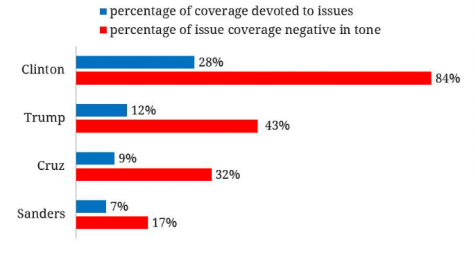 .
.
The amount of negative coverage each candidate received might have contributed to their record unfavorability ratings; Clinton’s was at 37% and Trump was at 53% in April, according to FiveThirtyEight. Nevertheless, they are in a country with an overwhelmingly uninformed electorate. Name recognition matters, proving “any press is good press” to be all too true.
Research from Harvard Kennedy School’s Shorenstein Center, reveals how little of Trump’s coverage had to do with policy issues: 12% of it. On the other hand, 34% of the coverage revolved around “activities and events,” reflecting that the news media failed to take him seriously in the beginning.
In fact, “CNN ran his speeches almost in entirety in the early months,” said John Oliver, host of Last Week Tonight.
By the time the news media took him seriously and condemned him, the damage had already been done.
“Not everything that was said about Trump’s personal characteristics and issue positions was negative in tone. Over 40% of it was positive in tone, often in the form of statements by voters who agreed with his policy positions or liked his personal style,” said Thomas E. Patterson, Bradlee Professor of Government and the Press.
Though the media eventually exposed Trump for his blatant racism, sexism, homophobia, and more during the primary and general election cycle, he became the nominee, and eventually, president.
However, because many people only like to read articles that match their opinion, many dropped the mass media.
John F. Kennedy explained this phenomenon in the 1960s: “Too often we… enjoy the comfort of opinion without the discomfort of thought.”
This universal problem has become even worse with the rise of extremely partisan news sources in this past election cycle, which are readily available on social media. Facebook has recently been under fire for its role in perpetrating this partisanism through its use of algorithms and lack of control of fake news sites.
According to senior technology writer for The Slate, Will Omerus, Facebook’s news feed algorithm collects information from nearly every facet of the site. This includes, but is not limited to, the pages one likes, the groups one is a part of, the people one follows, and the posts made by all of one’s friends. With a “constantly shifting” formula, the algorithm ranks all of the posts on the basis of what it believes the user will find “worthwhile.”
Privacy concerns aside, this ensures that Facebook users typically only see content that matches their views. Not considering other perspectives is dangerous, especially in this election. Liberals were absolutely shocked with the results of the election, as they thought most Americans shared their views.
This high level of obliviousness–on both sides– is a result of the millions of Americans who receive their news from platforms that cater to their views.
“There are 1.13 billion daily active users on Facebook and 313 million monthly active users on Twitter as of June 2016,” said The Chronicle, “44 percent of US adults claimed to have received information about the 2016 presidential election from social media.”
So, 44% of American adults get their information from a platform that prioritizes engagement. This can be problematic.
“Facebook’s trending news algorithm simply wasn’t sophisticated enough to distinguish an accurate news story from an inaccurate one,” said Timothy B. Lee, a senior correspondent at Vox.
This led to the rise of highly biased or simply inaccurate stories throughout the election cycle, some of which include: the pope endorsed Trump, the pope endorsed Sanders, a DNC employee was killed after testifying against Hillary Clinton, and Bill Clinton raped a thirteen-year-old girl.
This chart from BuzzFeed’s Craig Silverman shows how large the presence of fake news was in this election:
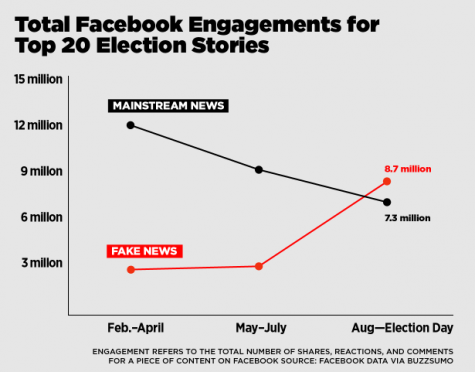 .
.
17 out of 20 of the fake news stories favored Trump, according to Silverman. Those blatant lies will likely increase during Trump’s presidency, now that he has emboldened his supporters.
The ability to discern fact from fiction is crucial to the health of our democracy.
For example, take this article that downplays climate change from Breitbart News. Breitbart News was under the leadership of Steve Bannon before he was Trump’s chief executive campaign manager, who cited it as a platform for the “alt-right,” which is associated with white nationalism, according to Heavy. Bannon has recently been named as Trump’s chief strategist and senior counselor.
The article, titled, “The real ‘politics of fear’? Climate alarmism,” said that an article listing foods that could go extinct due to climate change is “fear-mongering.” Author Thomas D. Williams spends much of the article attempting to debunk the possibility of the world’s coffee supply being in danger. However, if one turns to NPR, a news source that specializes in being objective, they can see that the world’s coffee supply is, in fact, in danger.
“Australia’s Climate Institute says coffee production worldwide is in danger because of climate change. It cites a study that says ‘hotter weather and changes in rainfall patterns are projected to cut the area suitable for coffee in half by 2050,’” said correspondent Lula Garcia-Navarro.
The North Pole is 36 degrees hotter than it should be right now, according to The Science Alert. Yet, widely-read sites such as Breitbart are debunking climate change. The rise of right-wing sites allowed for the election of Trump, who just appointed Myron Ebell, a climate change denier, to the head of the Environmental Protection Agency.
Though this isn’t necessarily the fault of the average American, as it is becoming increasingly easier to make a page look “official.” In his press conference in Germany this past week, Barack Obama commented on this troubling phenomenon.
“An explanation of climate change from a Nobel Prize-winning physicist looks exactly the same on your Facebook page as the denial of climate change by somebody on the Koch brothers’ payroll,” said Obama.
If these trends continue, the future doesn’t look promising. Trump himself has complained about journalists who challenge him. Americans pride themselves on the freedom of speech and the press and the ability to obtain information. Knowledge and, furthermore, the truth are precious. We must do everything in our power to protect them.

